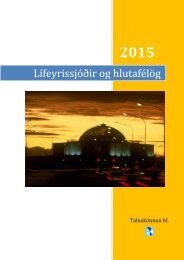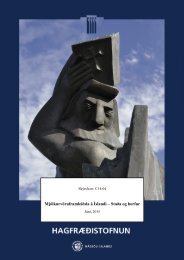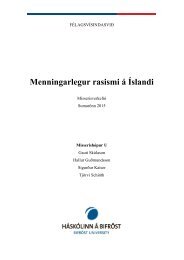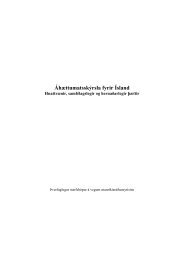Create successful ePaper yourself
Turn your PDF publications into a flip-book with our unique Google optimized e-Paper software.
WORLD REPORT 2016<br />
HUMAN RIGHTS WATCH<br />
which he obtained in 1998, 17 years before the criminal charges were laid, was a<br />
forgery. Gulmurodzoda maintained he acquired the documents legally.<br />
Numerous NGOs reported increased government harassment during 2015. As of<br />
July, 22 NGOs had reported that various authorities, including the Tax Committee,<br />
Ministry of Labor, and Ministry of Justice, were conducting intrusive checks<br />
into their activities, and threatening them with steep fines.<br />
The Justice Ministry introduced a bill that, if adopted, would require NGOs to register<br />
grants from foreign donors in a state registry prior to accessing them. The<br />
move raised concerns that the government planned to adopt measures to restrict<br />
the activities of independent NGOs similar to the “foreign agents” laws adopted<br />
in Russia and Azerbaijan.<br />
In July, Nota Bene, an independent think tank, announced that Justice Ministry<br />
officials had filed a suit to liquidate the organization for failure to properly register<br />
activities.<br />
Criminal Justice and Torture<br />
Authorities took some positive steps in recent years to bring the criminal code’s<br />
definition of torture into line with international law and provide compensation<br />
for some torture victims. But torture remains widespread in the criminal justice<br />
system. Police routinely use torture to coerce confessions and deny detainees<br />
access to counsel.<br />
In April, officers of Tajikistan’s Drug Control Agency detained 25-year-old Shamsiddin<br />
Zaydulloev. Visiting him the following day in custody, his mother told a<br />
local NGO: “When I petted his head, he said I shouldn’t touch the back of [it] because<br />
it was swollen and painful. I asked him in a low voice whether he was<br />
beaten and he nodded.” For the next three days, authorities prevented her from<br />
seeing him under various pretexts. On April 13, the family learned Zaydulloev<br />
was dead. His parents told their lawyer that when they saw his body in the<br />
morgue, it was covered in bruises. An initial autopsy by authorities stated the<br />
cause of death was pneumonia. The family’s lawyer has petitioned for a new autopsy<br />
and investigation into torture allegations.<br />
Freedom of Religion<br />
Tajikistan severely restricts religious freedom, regulating religious worship,<br />
dress, and education, and imprisons individuals on overbroad charges of religious<br />
extremism. Authorities ban several peaceful minority Muslim groups and<br />
Christian minority denominations, such as Jehovah’s Witnesses.<br />
Regulations also restrict the naming of children, headscarves are banned in educational<br />
institutions, and beards are prohibited in public buildings. On September<br />
3, 22-year-old Vakhdat resident Umar Bobojonov died in hospital of injuries<br />
he sustained during a police beating on August 29. Bobojonov’s relatives accused<br />
police of detaining him because of his beard. The Ministry of Internal Affairs<br />
stated it was investigating the incident, but no results have been made<br />
public.<br />
Authorities suppress unregistered Muslim education throughout the country,<br />
control the content of sermons, and have closed many unregistered mosques.<br />
Authorities kept in place a Parental Responsibility law, which requires parents to<br />
prevent their children from participating in religious activity until they turn 18.<br />
Domestic Violence<br />
Authorities took some steps to combat domestic violence against women and<br />
children in 2015, establishing several police stations staffed by female police inspectors<br />
who received training in gender-sensitive community policing. However,<br />
survivors of domestic violence, lawyers, and service providers reported that<br />
Tajikistan’s 2013 law on the prevention of violence in the family remains largely<br />
unimplemented and that victims of domestic violence continue to suffer inadequate<br />
protection. Impunity for severe acts of domestic violence and a scarcity of<br />
critical services for survivors remain the norm.<br />
Social and Economic Rights<br />
Tajikistan’s Rogun Dam and Hydropower Plant stand to displace over 42,000<br />
people before they become operational. Since 2009, authorities have resettled<br />
1,500 families to regions around Tajikistan. Despite commitments to comply with<br />
international standards on resettlement that protect the rights of the displaced,<br />
the government has not provided necessary compensation to displaced families<br />
560<br />
561










